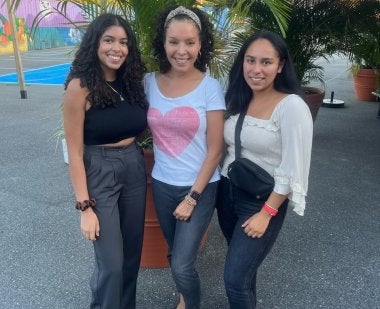
As an Afro-Puerto Rican, Delida Sanchez, associate professor in the counseling psychology program, cares deeply about supporting the mental health needs of the Latinx community. She studies the effects of racism and health disparities on mental and behavioral health outcomes of Latinx adolescents and young adults and creates culturally specific interventions aimed at advancing mental health and well-being in Latinx communities.
For Latinx Heritage Month, Sanchez shares the importance of the month-long commemoration and ways to honor and pay tribute to the rich cultures and contributions of Latinx communities.
What does Latinx Heritage Month mean to you?
Latinx/es are among the world’s most racially and ethnically diverse populations and make up almost 20% of the U.S. population. However, many Latinx/es face discrimination and educational and health inequities associated with systemic racism. Latinx/e Heritage Month is an opportunity to acknowledge the vast contributions of Latinxs to American society and enjoy the cultures, languages and diverse foods of Latinx/es.
How will you celebrate Latinx Heritage Month?
During Latinx/e Heritage Month, I look forward to gathering with friends and colleagues at the National Latinx Psychological Association’s annual convention. Latinx/e scholars and leaders host this annual psychology conference, focusing exclusively on scholarship and best practices for supporting the mental health needs of the Latinx/e community. This year’s theme is “Walking with Our Ancestres, Honoring Indigenous Wisdom & Decolonizing Our Psychology Toward Our Collective Liberation.”
What research initiatives or projects are you working on that will contribute to the well-being of the Latinx community?
My work examines racial group differences within the Latinx community in experiences of discrimination, health disparities and psychological well-being. I currently lead the National Latinx Research Alliance’s study on the mental health needs of AfroLatinxs. AfroLatinxs are an understudied and invisible group within the Latinx/e community and face significant stressors--racism and discrimination--based on both their Black and Latinx/e identities. This is true regardless of socioeconomic status or health outcomes.
I’ve also served on national organizations such as the American Psychological Association’s Cultural Committee on Ethnic Minority Affairs (CEMA). CEMA functions as a catalyst for action on BIPOC (Black, Indigenous and other People of Color) issues through research, education, training and the delivery of psychological services that address the concerns of BIPOC populations.
What are some ways people can celebrate Latinx Heritage Month?
Reading books by Latinx/e authors, attending festivals celebrating Latinx/e culture, attending conferences centered on Latinxs and supporting Latinx/e-owned businesses are all great ways to learn more about the richness of the Latinx community.
It’s also a time for many Latinx/es to teach and learn about their family’s history with elders in their community. For many Latinx/es, particularly those of Mexican descent, Día de los Muertos (Day of the Dead) on November 1 and 2 is a time to honor family members who have died by making ofrendas–home altars with their family members' favorite foods, drinks, pictures and other memorabilia– and attending parades throughout the country.
What part of your Latinx heritage are you most proud of?
I love the warmth, strength and fortitude of my culture. I come from a line of powerful woman healers (curanderas). I’m proud to carry on this legacy through my work as a counseling psychologist.